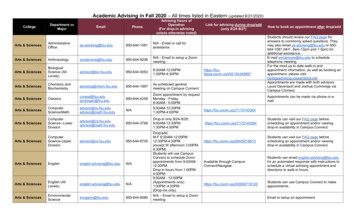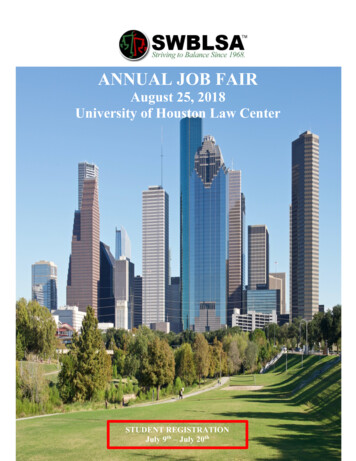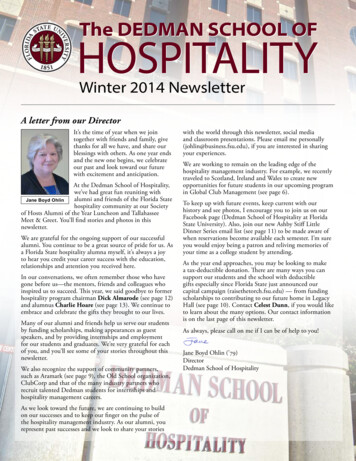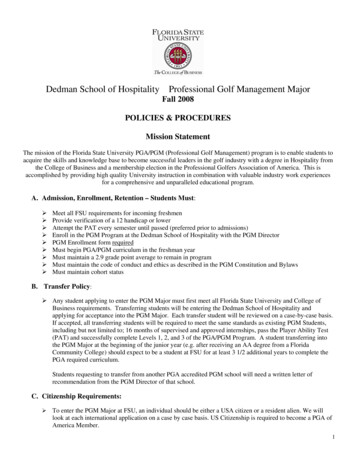
Transcription
View metadata, citation and similar papers at core.ac.ukbrought to you byCOREprovided by Southern Methodist University[Draft May 4, 2017]The SMU Dedman Law School - a “Global Law Center” for Seven DecadesIntroductionWith his experience from the Nürenberg Trials1, SMU Law Dean Robert Storeysaw the world growing smaller and smaller and the need for international cooperationgreater and greater. In this context, he recognized the critical importance of developinginternational institutions and international law and of promoting of the rule of law anddemocratic values. He also recognized how little American lawyers and law studentsknew about these new international challenges and about the importance of buildingbridges among the differing legal systems in the world (i.e., the need for fostering asound comparative law methodology). Thus, it is not by coincidence that in 1947 whenDean Storey articulated his vision of the SMU Law School as a “Legal Center”, he setabout to establish a major international and comparative law program (one of the first inthe country).The TraditionA.The Storey EraIn that same year of 1947, Dean Storey brought to SMU Professor A.J. Thomas,Jr. from the University of Michigan. Professor Thomas was soon to become the drivingforce behind the Law School’s international and graduate law programs. Also, in 1949,Dean Storey hired Professor Whitney Harris (a fellow Nürenberg Trial prosecutor).Professor Harris was to become the first director of the soon-to-be created Law Instituteof the Americas. In fact, it was in 1947 that Dean Storey himself taught SMU’s firstcourse in international law; and, the affiliated Southwestern Legal Foundation (nowCenter for American & International Law) held its first international law conference onpublic and private law issues.Also, in 1947, Dean Storey “poached” the Assistant Law Librarian from theUniversity of Texas, Ms. Hibernia Turbeville, to become the Law School’s law librarian(the Library, as was the Law School, was then located in the basement of Dallas Hall).Ms. Turbeville oversaw, until her retirement in 1979, the remarkable development of ourLaw Library and, particularly, of its renowned international and comparative law1In fact, The SMU Law School had the unique distinctions of having four of its professors involved inthese Trials (i.e., Storey, Whitney Harris, Charles Brudno and Jan Charmatz).1
collection. “Ms. T’s” commitment to this collection was further enhanced throughsuccessor librarians, Professor Earl Borgeson,, Professor Gail Daly, and our currentLibrarian, Associate Dean Greg Ivy.In the early 1950s, Dean Storey created a high quality Master of Laws program.His conceptualization of postgraduate legal education was of a “Graduate School ofAmerican and Foreign Law,” which was to be a cooperative endeavor between the LawSchool and the Southwestern Legal Foundation created to meet the challenges of worldleadership that had been pressed upon the legal institutions of the United States byinternational developments following WWII. The components of the original GraduateSchool comprised: SMU Law Institute of the Americas, the Academy of American Law,and the Foreign Specialist Program.The Law Institute of the Americas (established in 1952) brought together on theSMU campus U.S., Canadian, and Latin American scholars. The Institute obtainedsignificant funding from the Braniff Foundation, the Agency for InternationalDevelopment, and other major corporate and foundation sponsors. Also of historical note,the Institute conducted a joint Doctor of Comparative Law (D.C.L.) degree program withthe Autonomous National University of Mexico during the 1950s.The Academy of American Law (established in 1955) had as its primary purposeto provide a comprehensive program of legal study to a select group of foreign lawyers,judges, prosecutors, and professors who had not received training in Anglo-American law-- particularly those whose governments have manifested a desire to include certainAmerican legal principles in the framework of their legal systems (the main geographicalemphasis being on the Asia-Pacific area).The Foreign Specialist Program (a one-year graduate program) was designed forAmerican attorneys who wished to train for service abroad, with U.S. corporationsengaged in foreign operations, with governmental agencies operating abroad or withforeign clients.Dean Storey continued to add to the Law Faculty, during the 1950s, Professors ofinternational background and standing. For example, Professors Julio Cueto-Rua andGenaro Ruben Carrio, both of Argentina, were full-Faculty members; Professor RobertReigert was added as a comparative law scholar; and Professor Andrew Lee, Dean ofSoochow Law School, Taipei, became a frequent visitor. Also, during the 1950s,Professor A.J. Thomas, Jr. established himself as a recognized scholar on Latin Americanlegal institutions and on Inter-American organizations. Professors Thomas and CuetoRua, with Dean Storey’s strong support, helped develop the core of SMU’s acclaimedinternational and comparative law library collection during this period.In 1955 Dean Storey brought to SMU Professor Joseph W. McKnight, a RhodesScholar (Oxford law graduate). Professor McKnight came to teach such courses asEnglish Legal History and Roman Law. He also brought to SMU close Oxford andEuropean academic contacts that provided a basis for our current Oxford Summer Law2
Program and for periodic distinguished visitors. In addition, Professor McKnightestablished himself as a leading legal historian on Spanish law influences on Texas law,brought close Spanish and Mexican legal connections. Even more significantly, ProfessorMcKnight guided the development of one of the finest Commonwealth, Spanish andMexican law library collections in the United States.Coming to SMU in the late 1950s was Professor Jan Charmatz, a leadingcomparative law scholar. He had law training at Yale and in Prague, Czechoslovakia;and, he had served as an Associate Prosecutor at Nürenberg. Professor Charmatzreinforced SMU’s strengths in the comparative law area.B.Dean Rheim and the Professor Taubenfeld HiringProfessor John W. Rheim, Jr. (1959-63) brought to SMU a young internationallawyer, Howard J. Taubenfeld. Until his passing in 1996, Professor Taubenfeld came toestablish himself as a pathfinder in the area of air and space law and also in the areas ofwomen’s rights and multicultural societies. Professor Taubenfeld was responsible for theJournal of Air Law and Commerce coming to SMU.Also coming to SMU in 1960 was Professor Boris Kozolchyk, who had beeneducated in Cuba and had taught at the Universities of Chile and of Miami. ProfessorKozolchyk introduced the “thread” of comparative research in the commercial law area toSMU’s international dimension.In the 1960s, emphasis was still placed on foreign Professors and scholars fromLatin America (e.g., from Argentina and Chile) and Southeast Asia (e.g., China, Koreaand Japan), though funding became more limited. Also, a joint D.C.L. degree with theUniversity of Buenos Aires was established.C.The Galvin EraAs with Dean Storey, Dean Charles O. Galvin (1963-1978) provided strongsupport for the international graduate program, and for the development of a world-classinternational and comparative law collection (which came to be housed in the state-of-theart Underwood Law Library, one of Dean Galvin’s most significant contributions to theLaw School).Dean Galvin and his wife, Peggy, were noted around the world for theirgenerosity and hospitality as they hosted countless international students and visitors andas they visited abroad. The same was the case with Professors A.J. and Ann Thomas, whobecame “adopted parents” to scores of international students.Dean Galvin further solidified and expanded the Law School’s “internationalfaculty” through a series of significant faculty hirings. For example, in 1966 the Facultyhired Professor Charles J. Morris (who was to become an internationally recognized laborlaw scholar). He also added key administrative staff (e.g., Ms. Doris Beale and Ms. Jean3
Jury), who provided invaluable “nurturing” support for our international students andvisitors.In the mid-1960s, the Law School graduated its first Doctor of Juridical Science(S.J.D.) candidate, Dr. M. Aboul-Enein ( until his recent passing, Vice-President of theEgyptian Constitutional Court and Director of the Cairo Regional Centre for InternationalCommercial Arbitration).In 1972, Professor Beverly Carl joined the Faculty. She brought with herextensive governmental and legal educational experiences in the international area.Though her primary area of international interest was Latin America, Professor Carlcame to serve as the Law School’s “roving ambassador,” opening new and importantacademic relationships in Brazil, the P.R.C., Indonesia, Peru, and Venezuela. Shedeveloped a “new generation” of international law courses in the area of trade andinvestment in developing countries and in international dispute resolution.Next in 1973, Dean Galvin and Professor Thomas talked to a then young Dallaslawyer, Joseph J. Norton (who had studied at Edinburgh and had received his S.J.D. ininternational law from Michigan), to serve as an adjunct professor in a number ofinternational courses. Professor Norton joined the Faculty full-time in 1981 at the urgingof Dean Salacuse and Dean Ad Interim Thomas. Professor Norton since has establishedhimself as an internationally recognized scholar in banking and finance law (also jointlyholding the Chair of Banking Law at the University of London from 1993-2015).In 1974, Professor Cliff Thompson (who later became Law Dean at the Universityof Wisconsin) joined the Faculty. He was a graduate of Harvard and Oxford Universityand had significant and contrasting legal educational experiences in Europe and NorthAfrica.Furthermore, in 1974, Dean Galvin convinced Professor William Streng (a taxlawyer by training and the Deputy General Counsel of the Export-Import Bank of theUnited States) to come to SMU. Professor Streng developed courses in internationalbusiness and taxation and became a nationally recognized scholar in these areas.Professor Peter Winship joined the Faculty in 1975. Educated at Harvard andLondon, Professor Winship also had served as an adviser to the Ethiopian Government.Over the past twenty-plus years Professor Winship has established himself as aninternationally recognized commercial law scholar. He has been most active with respectto UNCITRAL and the International Institute for the Unification of Private Law and hasexpended considerable energy in the area of commercial law reform in developing andemerging economies. He is a leading expert on the Convention for the International Saleof Goods.In 1978, Professor Jeswald W. Salacuse (later to become SMU Law Dean from1980-86) joined the Faculty from the Ford Foundation and from extensive legalexperience in Africa. Dean Salacuse quickly established himself as an internationally4
recognized scholar in international business law and dispute resolution areas. He andProfessor Streng co-authored the leading multi-volume text on doing internationalbusiness.In that same year, Professor William Bridge (educated at Columbia and Paris)joined the faculty to help fill the comparative law void left by Professor Charmatz’sretirement. Professor Bridge, in addition to his comparative law teaching, was to becomeone of the catalysts for our Oxford Summer Law Program and for our JessupInternational Moot Court Competition and Wilhelm Vis Mock Arbitration Competition.The 1970s, however, presented an unfortunate event: the strains between the LawSchool and the Southwestern Legal Foundation increased to the point that the Foundationleft the SMU campus to locate at the new University of Texas at Dallas.D.A. J. Thomas, Jr.From 1978-1980, Professor A.J. Thomas, Jr. served as Dean Ad Interim, guidingthe institution through one of its most tumultuous periods. “A.J.’s” contribution to the“international dimension” cannot be overstated. As discussed above, Professor Thomaswas the anchor for the Law Institute of the Americas for two decades and for theGraduate Law Program generally for three decades until his untimely death in 1983; and,he was a public international law scholar of international reputation.E.The Salacuse PeriodIn 1980 Professor Jeswald W. Salacuse succeeded as Dean. This was a “windowin time” when Dallas was aspiring to be an “international-class business and financialcenter.” Dean Salacuse became the driving force for the expansion of both the LawSchool’s and the University’s international profile. He encouraged faculty members intheir international activities and increased the number of foreign Visiting Professors (e.g.,Sir Guenter Trietel of Oxford, Dr. Bernard Grossfeld of Muenster, and Professor JohnCairns of Edinburgh). In addition, Dr. Werner Ebke joined the Faculty for several yearsbefore assuming the Chair of International Business Law at the University of Konstanz,Germany and later the Chair in HeidelbergIn 1983, Dean Salacuse, with Professor Norton, was instrumental in theestablishment of the University-wide Institute of International Banking and Finance,which has generated a series of international conferences on-campus and of scholarlybooks and publications.Dean Salacuse promoted, with Professors McKnight and Bridge and thenProfessor Paul Rogers, the creation of Summer Law Programs at University College,Oxford University and at the University of Edinburgh. The Oxford Program remainsvibrant today and the Law School maintains close Faculty relations with Edinburgh.5
The Academy of International Taxation in Taipei was also found during DeanSalacuse’s tenure, with the assistance of Professors Lischer and Norton. The Academyremains active today in the training of Chinese and other Southeast Asian tax officials,thanks in large part to the on-going efforts of Professors Emeriti Lischer and Mylan, andProfessor Hanna.F.Dean PenegarIn 1986, Dean L Penegar came to SMU with a broad international perspective,having studied in London and having served as a Visiting Professor for a period at theUniversity of Delhi, India. Dean Penegar’s decanal tenure came at one of the mostdifficult times in the academic and financial life of the University and in the economiclife of Dallas and Texas. However, Dean Penegar continued to expand the internationalactivities of the Law School. He helped bring to the Law School The InternationalLawyer (the most widely distributed English language international law journal in theworld); he oversaw the curriculum creation for several new international courses; hesupported major international conferences and resulting book publications; he brought tothe Faculty our first interdisciplinary and third-world scholar, Professor Ndiva KofeleKale; and he encouraged and supported numerous Faculty members in their research,travels, and sabbaticals outside the U.S. Also, of significance, Dean Penegar appointedProfessor Marc Steinberg from the Maryland Law Faculty as our Radford Professor inbusiness law and securities regulation. Professor Steinberg is not only one of the leadingexperts in U.S. securities law but he soon became a leading expert in internationalsecurities regulation. In addition, Marc is the editor-in-chief of Securities Regulation LawJournal and is the current professional editor-in-chief of The International Lawyer, themost widely distributed international law journal in the English-speaking world. Over theyears, Professor Steinberg’s experience has come to include appointments as a VisitingProfessor, Scholar or Fellow at law schools outside of the United States, including atUniversities in Argentina, Australia, China, England, Finland, Germany, Israel, Japan,New Zealand, Scotland, South Africa, and Sweden.G.Dean Rogers and The RenewalThough most difficult financial constraints prevailed from the late 1980s until1992-93, Dean C. Paul Rogers III (1988-97) continued the decanal tradition of strongsupport of the Law School’s international programs. As a result of this support, we nowhave a fully accredited International Law Review Association comprising over sixty J.D.students. He also facilitated the creation of the NAFTA: Law and Business Review of theAmericas and brought to SMU the Inter-American Legal Materials.Dean Rogers was instrumental in the hiring of Professor John Lowe asHutchinson Professor of Energy Law, an internationally recognized expert on energy law.He also made two significant young Faculty hires: Professor Christopher Hanna andProfessor Jane Winn, each of whom significantly enhanced the Law School’sinternational strength. Professor Hanna (an expert in domestic and international tax)6
became a driving force behind the formation of the Centre for Pacific Rim Legal Studies,of which he remains a Co-Director. Professor Winn (now at the University ofWashington) brought particular knowledge and experience (including fluency inMandarin Chinese) in the Greater China Region. She was also at the forefront of law andtechnology developments (internationally and domestically) and she served as a CoDirector of the Pacific Rim Centre.As the University and Dallas began to emerge from their difficult economic timesin 1992-93, Dean Rogers and the Law School’s Executive Board quickly recognized thatlegal and business environments were becoming more and more internationalized. Hebegan a series of major visits abroad, reactivated a major on-campus annual internationalconference, and helped establish the Centre for Pacific Rim Legal Studies and the interimCentre for NAFTA and Latin American Legal Studies (which later became expanded intoa reactivated Law Institute of the Americas).H.Dean Ad Interim Harvey WingoIn the Fall semester of 1997, Professor Harvey Wingo was requested (for thesecond time in his distinguished 30 year career at SMU) to serve as Dean Ad Interim.Dean Wingo had engaged in significant comparative constitutional law school research inCanada and had been a Visiting Professor in Taiwan. One of Dean Wingo’s first acts asDean was to consult with the Provost, University Development Officers, and keyinternational law Faculty to ensure that the international section and priorities of the LawSchool’s “Long-Term Strategic Plan” be given continuing support.Dean Wingo secured financial support to assist SMU Faculty members to deliverlectures in Buenos Aires, Caracas, Mexico City, London, Edinburgh, Germany, Australia,Beijing, and Hong Kong; and to organize several international conferences/roundtableson campus. Additionally, he helped secure (with Professors Rogers, Daly, and Winn)funding of 1 million from the Hillcrest Foundation for new Law School technology, partof which will be designed to enhance the Law School’s international programs. DeanWingo also secured funding (with assistance from Professors Lischer, Norton, andRogers) for the Law Institute of the Americas from H.D. Vest Financial Services,Incorporated. In the Spring of 1998, Dean Wingo oversaw a major one-weekCelebration of 50 Years of Legal Education at SMU.I.Dean John B. AttanasioIn July 1998, Dean John B. Attanasio became the 10th Dean of our Law School.Dean Attanasio was an expert in the field of constitutional law with an international focuson constitutional development in emerging democracies.7
Dean Attanasio undertook significant efforts to expand our internationaldimensions and to create a solid foundation for a true Global Legal Center. For example,he helped orchestrate conference visits by members of the South African ConstitutionalCourt, the Russian Constitutional Court and the European Court of Justice (with membersof the U.S. Supreme Court); a global series of six conferences at major law facultiesaround the world (including at SMU) on the “New International Financial Architecture”(producing four book publications and two major Symposium Issues of The InternationalLawyer); the dedication of the Sir Joseph Gold memorial library collection ininternational monetary and economic law (including a related major internationalconference on campus); and a major international and comparative law conferencecelebrating the 75th birthday of Professor Joseph McKnight. Dean Attanasio has alsobeen a tireless “ambassador” for our Law School, with his travels throughout Asia, LatinAmerica and Europe. He (with former Dean Rogers) was instrumental in establishingthe Helmut Sohmen Endowed Scholarships for Chinese Graduate Students.Also, during Dean Attanasio’s tenure, there were a number of major internationalFaculty hires: (Prof. Jenia Turner, Prof. Jeff Kahn, Prof. Anthony Colangelo, Prof. JoshuaTate, Prof. Nathan Cortez, Prof. Keith Robinson, Prof. David Taylor, Prof. Chris Jenksand Prof. Orly Mazur.J.Dean ad Interim Julie ForresterDuring 2013-2014, our Professor Julie Forrester served as Dean ad Interim. DeanForrester, with former Dean Rogers, took an alumni relations trip to Southeast Asia. Theyreestablished relations with certain of our illustrious Taiwanese alumni, whichrelationship has been followed up by and concluded by Dean Collins. Dean Forrester alsorevitalized relations with Hon. Helmut Sohmen, OBE from Hong Kong and benefactor ofour prestigious Sohmen Scholarships for Chinese graduate students. In addition, DeanForrester helped raise the funds for our two new, major clinics, one of which deals withhuman trafficking issue (a subject of increasing international concern).K.Dean Jennifer CollinsIn June, 2014, Jennifer Collins, Associate Provost and Professor of Law fromWake Forest, was appointed Dean of the Law School . Dean Collins took over the reins ata time when Legal Education was undergoing significant strains and challenges(including a nationally declining application pool) and when SMU, as a University, wasembarked upon a major institutional and financial reassessment, Though her initial daysat the Law School were preoccupied with such difficult matters, Dean Collins, with herAssociate Dean Becca Henley, have made major improvements in the quality of life forour domestic and international law students.In June 2015, Dean Collins appointed our Assistant Dean for Student Affairs,Martin Camp, as Assistant Dean for Graduate and International Programs. Martin (who8
has significant international experience, has been charged with restructuring ourinternational efforts. Martin is assisted by Ms Bobbye Heine, Assistant Director forGraduate Legal Programs. Complementing Martin and Bobbye was the appointment ofStephen Yeager as Martin’s replacement as Assistant Dean for Student Affairs. Stephenhas been highly proactive in establishing (with Prof. Steinberg) such programs as theCorporate Counsel Externship, which involves over 50 major corporations (many ofwhich has significant international dimensions.Dean Collins also has finalized the structuring and funding of our Tsai Centerand our two new Clinics. In the Summer/Fall 2017, Dean Collins is planning a majortour to visit alumni in Southeast Asia, and she has authorized Assistant Dean Camp toundertake several overseas trips to help promote further our international programs.The Fruits of the TraditionIn sum, the “fruits” of our Law School’s global tradition include the following: an international alumni base of over 2000 in over 100 countries, many of whom arenow at the highest levels of government, legal practice and business in theirrespective countries;one of the most developed and longstanding LL.M programs for internationalstudents;a library rich in international and comparative legal resources;a faculty, over half of which are actively involved in international studies;a “top twelve” curriculum long-known for its strengths in business, commercial,taxation and international law and in dispute resolution;a well-functioning visiting scholar and SJD program designed to promotepostgraduate international legal scholarship;a program for the regular visits of distinguished law professors from around the worldthe most comprehensive array of student-edited and faculty supervised internationalpublications of any law school (i.e., with The International Lawyer, Law andBusiness Review of the Americas, , and a Kluwer International Book Series onInternational Economic Development Law);three active, student international moot dispute resolution programs;a high quality summer program at University College, Oxford;worldwide academic institutional links that can offer students a semester abroad orpostgraduate legal studies abroad;Faculty regularly studying and lecturing abroad and being involved with law reformefforts on a global basis;regular, high-level international conferences, research seminars, roundtables anddistinguished lecture series;regular, co-sponsorship of international conferences in Europe, Africa, Asia andLatin America;an external Executive Board that is committed to assisting in the establishment of aglobal law school environment; and9
a local community containing a highly sophisticated legal profession, one of thelargest arrays of multinational firms in the country, one of the major high tech bases,and one of the major international airports and transportation networks in the country.Our Current Challenge: A Relevant Global Legal EducationOur concept of a Global Law Center is a “legal education center” thatinterconnects law committed faculty members with a core of domestic and internationallaw students and dynamic external elements of the local, national and international legaland business communities in order to create a synergistic environment for training andretooling lawyers, domestic and international, who will help build the global marketplacein the 21st century. This emerging “global environment” will necessitate the developmentof alternative legal and quasi-legal arrangements, standards, and institutions andfundamental constitutional, economic, and commercial law reform within and among thenation-states of the world. This will require lawyers capable of shaping and functioningwithin this new “law-based” environment and being sufficiently agile to respond to ourquickly changing international and domestic legal/political environments. In doing this,we recognize the need to address the conflicting strands and pressures of modern-daypopulism-nationalism, anti-globalization, anti-multilateralism, anti-statism/antiregulatory state , anti-free trade and anti-open borders. A revised and critical teaching andpromotion of the role of law and the rule of law, along with sound domestic, regional andinternational institutions, are even more important for our Law School and its studentstoday than they were in the “Storey Era” immediately after WWII.This concept of a relevant and modern-day Global Law Center is not just abouttraditional international and comparative law teaching or about producing lawyers towork in a select group of international law firms or intergovernmental institutions: it isabout educating lawyers working in a local-domestic environment to understand and tobe responsive to the sundry effects and implications (good and bad) of globalization andabout lawyers who can assist in affecting appropriate and meaningful policy, legal andinstitutional reforms conducive to sustaining and expanding a viable, sustainable andequitable global environment. This new global environment significantly will impactmost (but, not all) areas of traditional legal education. One of our Law School’s goals isto provide each of our students, domestic and international, with a practical and ethicalopportunity to prepare him/herself for the ever-changing and ever-challenging globalenvironment of the 21st Century.10
The SMU Dedman Law School - a "Global Law Center" for Seven Decades Introduction 1With his experience from the Nürenberg Trials , SMU Law Dean Robert Storey . generosity and hospitality as they hosted countless international students and visitors and as they visited abroad. The same was the case with Professors A.J. and Ann Thomas, who










